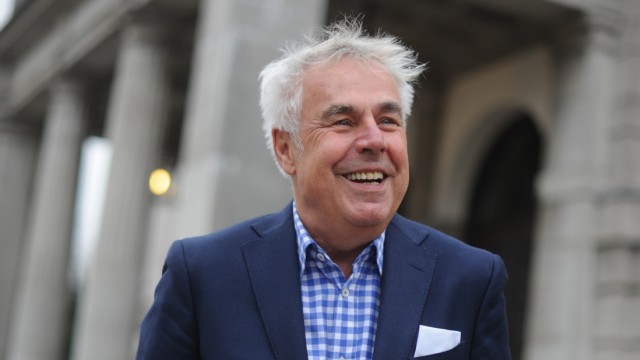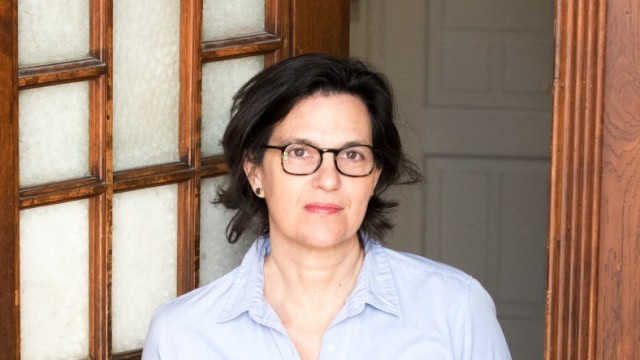Karaoke in Bavaria
Four friends found a cultural grievance in Munich: In their opinion, the city didn’t have any good karaoke, which is the live singing of well-known songs to instrumental playback Uh Seok Han. “Apart from the Guinness-soaked 3-per-mille Wonderwall roar in Irish pubs or the shameful 6-tequila sunrise infusions of Sweet Caroline in Thai restaurants,” says the 31-year-old. That’s why Han is organizing it together Robert Lohmeyer, Sarah Löscher and Elena Pabst since February 2023 “Karaoke Bayern” in the “Goldener Reiter” nightclub in the Glockenbachviertel. The fourth edition is scheduled to take place there on October 31st.
The educational side was particularly important to Han. “Singing is one of the most beautiful and accessible forms of human expression and communication,” says Han. For him, music is a medium to tell stories and communicate feelings in a way that words alone are sometimes not capable of. However, not many adults sing loudly in public anymore. Why? Han has a theory about this. He believes they were told when they were younger that they couldn’t sing well, so they simply didn’t dare to sing anymore. “And if so, then only ironically and drunk, so that you don’t make yourself emotionally vulnerable if someone makes fun of you again,” explains Han.
With his series of events, he wants to give exactly such people a safe place where they can let everything out – even the wrong things. So far, apart from the technology, he adds, it has worked well.
Delicatessen in Brunnthal
Brigitte Behler.
(Photo: Feinkost Käfer)
The Italian region of Emilia-Romagna is famous for Parma ham. The pork hind leg is rubbed with sea salt and matured for at least fourteen months. Last year around eight million of these Parma hams were produced. About a third is exported. 363,000 pieces were delivered to Germany, including from the Brunnthaler delicatessen Brigitte Behler sold. The association of Parma ham producers, Consorzio del Prosciutto di Parma, has now recognized her as a Parma ham specialist for the fourth time. The jury highlighted her customer advice.
Queer in old age
In the interdisciplinary project “With Your Traces,” six photographers from Munich met queer seniors, accompanied them for a year and took photos again and again. The result is videos and photographs, some of which have already been presented in the Pinakothek der Moderne as part of the exhibition “Hey Alter”. The artists Stella Deborah Traub, Francesco Giordano, Mara Fischer, Florian Tenk, Joseph Wolfgang Ohlert and Teo Ana Apostolescu are currently running a crowdfunding campaign to finance an illustrated book. The project aims to help break down barriers, share knowledge and preserve queer heritage in Munich and Bavaria. It is also intended to create a platform for dialogue, empowerment and collaboration between different generations and interest groups. “We work with the political legacy, the path that you paved for us. We don’t always follow in your footsteps, but thanks to your courage, we follow in your footsteps.”
Jews in Germany

C. Bernd Sucher.
(Photo: Stephan Rumpf)
What is everyday life like for Jews in Germany? Do they feel safe? Today, almost 80 years after the Shoah, has a Jewish-German culture re-established itself beyond memory? The author, journalist and professor C. Bernd Sucher has embarked on a search for clues into the past and examined the present. He compiled his findings in the book “Unsecure Homeland”, in which he sketches a picture of German Jewry, although without taking current events in Israel into account.
It is a picture between a culture of remembrance and a search for identity, a re-emergence of anti-Semitism and the desire for acceptance in a multicultural German society. “German Jews want nothing more than a safe homeland,” says Sucher. Today, around 95,000 people in Germany belong to a Jewish community. In comparison: More than five million Muslims live in Germany.
Sucher, 74, has been a professor at the Munich University of Television and Film (HFF) since 1996 and headed the theater, film and television criticism course at the August Everding Theater Academy. With the event series “Suchers Passions” he became widely known in German-speaking countries. For many years, Sucher was a theater critic for the Süddeutsche Zeitung and Die Zeit and has written numerous books. He will present “Unsecure Homeland”, which will be published by Piper Verlag on November 2nd, on November 5th, 11 a.m., at the VHS in Garching, on November 7th, 8 p.m., at the Residenztheater and on November 28th, 7 p.m. in the Jewish Museum.
Women in the theater

Paula-Irene Villa Braslavsky.
(Photo: Catherina Hess)
Not being a mother, being a trans woman, having or not having children, the relationship with your own mother, pregnancy, abortion. At the documentary listening theater “(Not) Mothers!” In the Marstall, the creators Barbara Horvath, Theresa “BiMän” Bittermann and Lisa Stiegler bring questions about being a woman and motherhood to the stage. After the performance on Tuesday, October 31st, there will be an audience discussion with the German-Argentinian sociologist Paula-Irene Villa Braslavsky instead of. She holds a chair for general sociology and gender studies at the Institute of Sociology at LMU Munich and is the recipient of the Helge Pross Prize 2022.

